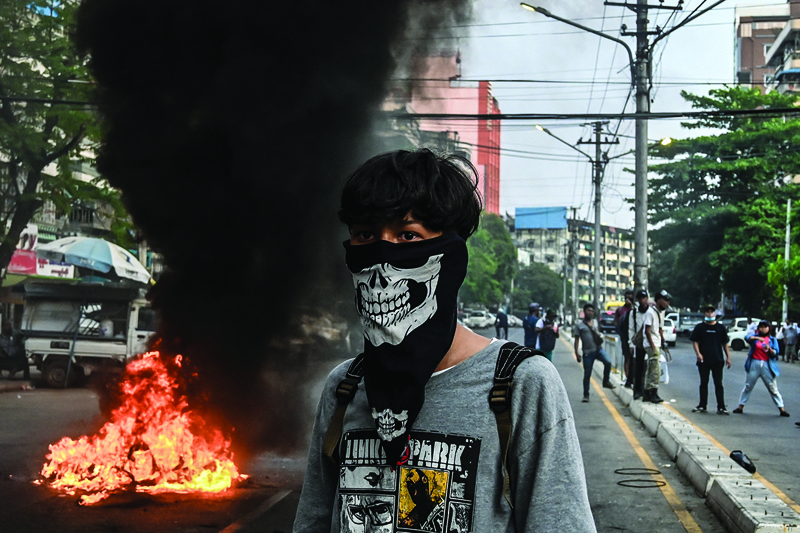 YANGON: A protester with his face covered stands near a burning makeshift barricade along a road during a protest against the military coup, in Yangon on Tuesday.-AFP
YANGON: A protester with his face covered stands near a burning makeshift barricade along a road during a protest against the military coup, in Yangon on Tuesday.-AFPYANGON: The United States yesterday ordered the departure of non-essential diplomats from Myanmar, amid growing violence following the military coup to oust civilian leader Aung San Suu Kyi. Daily protests demanding the restoration of the elected government have been met with a military crackdown that has left more than 520 civilians dead in the weeks since the February 1 coup.
The junta's violent response has triggered international condemnation-and threats of retaliation from some of Myanmar's myriad ethnic armed groups. The US State Department said it was ordering the departure of "non-emergency US government employees and their family members". The decision was taken to protect the safety and security of staff and their families, the State Department said.
Meanwhile, Myanmar's ousted civilian leader Aung San Suu Kyi appears in good health despite two months of detention, her legal team said yesterday as diplomatic pressure on the military junta ramped up. The 75-year-old Suu Kyi has not been seen in public since she was deposed by the military and detained in the early hours of February 1.
But a member of her legal team, Min Min Soe, was summoned to a police station in the capital Naypyidaw for a video meeting with her yesterday. Suu Kyi is facing a raft of criminal charges and conviction could see her barred for life from political office. "The physical situation of DASSK (Suu Kyi) seemed good according to her appearance on video screen," her legal team said in a statement.
World powers have repeatedly condemned the violent crackdown on dissent and hit top junta cadres with sanctions. But the pressure has not swayed the generals. Saturday, the annual Armed Forces Day, saw the biggest loss of life so far, with at least 107 people killed. The spiraling bloodshed has angered some of Myanmar's 20 or so armed ethnic groups, who control large areas of territory mostly in border regions. Three of them-the Ta'ang National Liberation Army, the Myanmar Nationalities Democratic Alliance Army and the Arakan Army (AA) -- on Tuesday threatened to join protesters' fight unless the military reined in its crackdown.
While the trio has yet to act on their warning, two other outfits-the Karen National Union (KNU) and the Kachin Independence Army (KIA) -- have stepped up attacks on military and police in recent days. A police station in Bago was reportedly hit with a rocket attack that injured five officers on Tuesday, though it was not clear who was responsible. The KNU, one of the biggest rebel groups, took over an army base in eastern Kayin state at the weekend, prompting the military to respond with air strikes.
Wounded cross border
Around 3,000 people fled through the jungle to seek safety across the border in Thailand after the weekend strikes. The Thai foreign ministry said late Tuesday about 2,300 have returned to Myanmar, while about 550 remain in Thailand. Karen activists have accused the Thai authorities of pushing people back and accused them of blocking UN refugee officials from the area.
Thai Prime Minister Prayut Chan-O-Cha insisted that there was "no influx" of refugees and that the kingdom's authorities had not "scared them off with guns or sticks". Some Karen people injured in the weekend strikes sought medical treatment Tuesday on the Thai side of the border-the most serious case was a 15-year-old with a collapsed lung and broken rib.
Thai police said they had intercepted 10 parcels containing 112 grenades and 6,000 rounds of ammunition in northern Chiang Rai province that had been destined for Myanmar's notorious border town Tachileik. The UN Security Council will hold an emergency session on Myanmar on Wednesday, requested by former colonial power Britain. The 15 members will meet behind closed doors, beginning with a briefing from the UN's special envoy on Myanmar, Christine Schraner Burgener.
Meanwhile, Japan has halted new aid to Myanmar in response to the coup, according to the country's foreign minister, but is stopping short of sanctions imposed by some nations on military and police commanders. Japan is a top aid donor to Myanmar, and Foreign Minister Toshimitsu Motegi said the suspension of assistance would send a "clear" message. "For Myanmar, Japan is the largest provider of economic assistance," he told parliament on Tuesday.
The suspension reportedly affects only new aid, not existing projects, local media said. More than 500 civilians have been killed in the Myanmar military's crackdown on protesters, and world powers have ramped up their condemnation of the campaign against the anti-coup movement. - AFP










